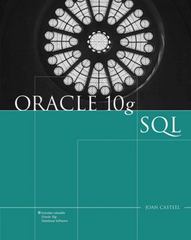Question
Determine if a number is perfect, abundant, or deficient based on Nicomachus (60 - 120 CE) classification scheme for natural numbers. The Greek mathematician Nicomachus
Determine if a number is perfect, abundant, or deficient based on Nicomachus (60 - 120 CE) classification scheme for natural numbers. The Greek mathematician Nicomachus devised a classification scheme for natural numbers, identifying each as belonging uniquely to the categories of perfect, abundant, or deficient based on their aliquot sum. The aliquot sum is defined as the sum of the factors of a number not including the number itself. For example, the aliquot sum of 15 is (1 + 3 + 5) = 9
Perfect: aliquot sum = number
6 is a perfect number because (1 + 2 + 3) = 6
28 is a perfect number because (1 + 2 + 4 + 7 + 14) = 28
Abundant: aliquot sum >number
12 is an abundant number because (1 + 2 + 3 + 4 + 6) = 16
24 is an abundant number because (1 + 2 + 3 + 4 + 6 + 8 + 12) = 36
Deficient: aliquot sum< number
8 is a deficient number because (1 + 2 + 4) = 7
Prime numbers are deficient
Implement a classify function to determine whether a given number is perfect, abun-dant, or deficient. The function should take a numeric argument and return perfect, abundant, or deficient. If the passed number is non-positive, the classifyfunc-tion should raise a ValueError
.
Step by Step Solution
There are 3 Steps involved in it
Step: 1

Get Instant Access to Expert-Tailored Solutions
See step-by-step solutions with expert insights and AI powered tools for academic success
Step: 2

Step: 3

Ace Your Homework with AI
Get the answers you need in no time with our AI-driven, step-by-step assistance
Get Started


